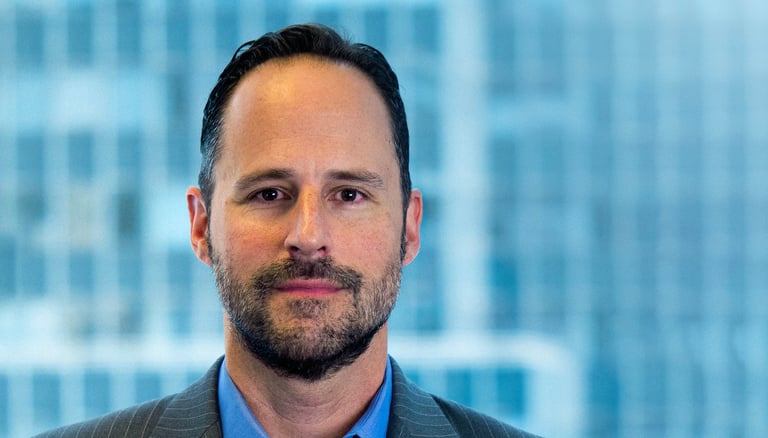'Nobody’s looking out for the little guys'

By Cape Capital
24.10.2023

The trader whose investments don’t just make money, they challenge the consensus too; Matthew Tuttle on going against the market majority.
At Cape, we're no strangers to the ever-evolving landscape of investment strategies, and have actively integrated ESG principles, and purpose-led investing into our own product landscape. The world of finance is a multifaceted one, with countless perspectives on how to navigate it successfully. In the spirit of this REBELS edition of FOLIO, we firmly believe in the importance of considering contrasting viewpoints, even those that don't necessarily align with our own. That's precisely why we've chosen to feature Matthew Tuttle in this piece. In today's divided world, where investment strategies and social responsibility often converge, we thought it essential to listen to someone who dares to challenge consensus.
Matthew is a forthright, data-driven ETF trader with a unique approach that not only generates returns but also challenges the status quo. We found Tuttle's perspective intriguing, and we believe his insights will provide you, our dear readers, with food for thought on what is undeniably a divisive topic in today's financial world. It is, after all, your prerogative to form your own conclusions, but we thank Matthew for giving us a fresh perspective and hope you enjoy this exploration of his unconventional approach.

‘Past performance is no guarantee of future results’ is a warning statement plastered on almost every piece of investment literature. Yet, argues Matthew Tuttle, founder of Connecticut-based Tuttle Capital Management, that’s precisely how the majority of the sector operates. ‘It’s the biggest single mistake investors make. Think about it: if you put money in any type of investment, does it matter what it did in the past, or is it only what it does in the future that’s important?’ Instead, what he does is use ‘forward looking due diligence’ (or as he calls it, common sense) to evaluate the reasons why a portfolio has performed in a certain way. ‘It’s about looking at what happened in the past but with a forward mindset and asking, is that sustainable in the future and what could go wrong.’
This methodical, data driven approach extends to his wider, overall investment strategy which eschews the current penchant for having ESG within an investment portfolio. ‘When I started in financial services you hired a broker to make you money, full stop. In the 90s that started to shift. It didn’t start to shift because broker firms realised there was a better way for clients; it started to shift because they realised there’s a better way for them. The goal became to have a globally diversified portfolio, managed according to risk tolerance and goals, compared to some benchmark which is not 0. If the market goes down 30 percent and you’re down 28 percent, they say they did a good job. To me, that’s unwise. When I saw that happening, I realised I had to do this stuff myself,’ explains Matthew, who set up his first advisory service company, Tuttle Wealth Management, in 2003.

An outspoken advocate of keeping investments and social responsibility separate, Tuttle believes; ‘You don’t invest to change the world. If you want to change the world, make as much money as you can and use that to contribute to whatever cause is important to you. Don’t do it with your investments,’ says Matthew, who reasons that businesses spending their time and resources on environmental and political issues could potentially hurt their reputation, and therefore lower their stock price. ‘I think the data is compelling about the possibility of politically neutral stocks outperforming those that engage in politics. The other issue I have is that ESG has morphed so now there are some huge asset management firms with amazing power because they own so much of the outstanding shares of these companies. They have zero accountability and I think that’s an extremely slippery slope.’
In 2015, Matthew moved into managing publicly traded ETFs – quite literally putting his money where his mouth is. ‘My investment strategy is that you need to be solely focused on making money. My goal every day is to make money: I don’t care if the market’s up, the market’s down or the market’s sideways. The benchmark is not the market, the benchmark is zero,’ he emphasises. His advice to individual investors includes being agnostic between long and short, ignoring the traditional asset allocation of a 60/40 portfolio and that bonds do not protect stock. Above all though, his biggest tip is that the consensus is usually wrong about the markets. ‘If you take a bunch of people and ask them what the market’s going to do, they’ll probably be wrong.’

One person who Matthew thinks is more wrong than right is Jim Cramer, who presents the ‘Mad Money’ show on CNBC where he offers viewers investment advice. ‘Jim Cramer is the consensus on steroids. He’s forced to swing at every pitch – whether it’s a question about oil stock, semiconductor stock or food stock, and throughout time he has made some historically horrific calls,’ Matthew says, citing Cramer’s recommendation to buy stock in Silicon Valley Bank a month before it went bankrupt as an example. ‘What really irritates me is that he’s treated with deference. Somebody’s got to take the other side.’ The way he does this is through launching ETFs – in this case the Inverse Cramer which takes the opposite investing position of the host’s major calls. If Cramer says buy, the fund shorts it; if Cramer says don’t buy, the fund goes long.
It’s not the first time that Matthew has successfully taken the other side. He has previous form with the famous Short Innovation Daily ETF (now owned by AXS Investments), which bets against fund manager Cathie Wood. ‘She came out with a thesis that was initially brilliant, based on investing in the next generation of innovation. Right after Covid, interest rates went down, the American market zoomed up and those companies took off,’ he recalls. ‘They are very speculative and sensitive to interest rates so I knew it wouldn’t continue yet I saw the media bringing her out and calling her the next Warren Buffett. That gets my back up because there can never be another Warren Buffett; the landscape that allowed that doesn’t exist anymore. I knew people who bought into her fund at its height with more than they should, and could see that they would get hurt. There was also zero risk management which no-one cares about when they’re making money.’
His latest soon-to-launch products include a short on regional banks, and a long and short AI ETF, both aimed at individual retail traders. ‘Because of the bad investment advice on Wall Street, there’s a massive amount of individual investors who trade on their own and have created a community through social media, which I’m part of. It’s my incubator for a lot of the ideas I come up with,’ he says. ‘AI will change all our lives in some way so from an investment standpoint, it’s going to be a dominant theme for quite some time.’ He is also creating another attention-grabbing ETF, named Go Woke Go Broke, which will invest in companies that are politically neutral.
What motivates his opinionated stance? ‘Wall Street is extremely unkind to people who aren’t educated. When they try to learn more about their finances, they turn on CNBC and get ridiculous advice. There’s nowhere for these people to go so they get taken advantage of. In my career on Wall Street, I saw it happen again and again,’ says Matthew, who previously did stints at Bear Stearns as well as insurance companies including Prudential Securities and MetLife. ‘Nobody is looking out for the little guys and somebody has to. I’ve got the ambition for it and I don’t mind pissing people off. I want to create investment products that I would use myself. At the same time, if I can take the other side of some hypocrisy, so much the better.’
Matthew Tuttle is the Chief Executive Officer and Chief Investment Officer of Tuttle Capital Management.